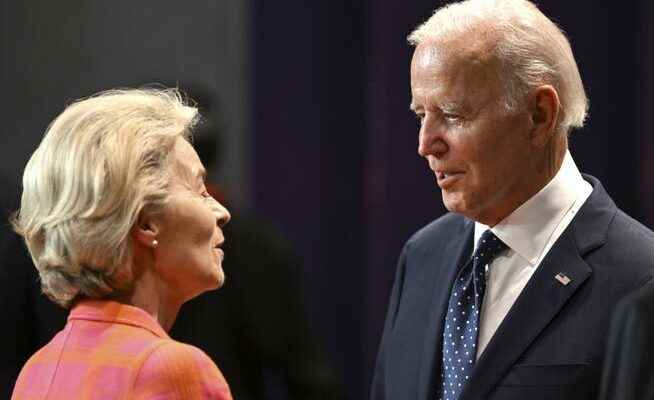In Washington, representatives of the USA and the EU are trying to clear up differences regarding the American Inflation Reduction Act. Meanwhile, the President of the EU Commission, Ursula von der Leyen, wants to imitate the transatlantic partner.
Ursula von der Leyen and Joe Biden, here at the G20 meeting in Bali in mid-November.
The United States and the European Union on Monday reported progress in joint talks over the Biden administration’s protectionist climate policy. The EU concerns about the American climate law, which would exclude electric vehicles from the EU from the American tax credits.
After the third ministerial meeting of the US-EU Trade and Technology Council (TTC), both sides issued a joint statement in which they promised to work constructively towards a solution. Despite the progress cited, the matter could not be resolved.
“We acknowledge the EU’s concerns and underscore our commitment to address them constructively,” the statement said, noting the progress of a task force set up to resolve the dispute.
EU Trade Commissioner Valdis Dombrovskis on Monday called the US $430 billion Inflation Reduction Act discriminatory and urged steps to amend the law before the end of the year.
Will the US give in?
On Sunday before a meeting of the transatlantic partners, Ursula von der Leyen gave a speech outlining a possible response by the European Union to the US Inflation Reduction Act (IRA), which has been criticized as protectionist. However, the President of the EU Commission had hardly considered the possibility of the USA giving in.
Specifically, the Europeans are annoyed by the protectionist aspects of the IRA. The law, which goes into effect in early 2023, envisages investments of $369 billion in green energy. biden spoke at a joint media conference with Macron in Washington about the largest investment in climate protection in history (the USA).
For example, the IRA provides tax credits for the purchase of electric cars. However, the condition for this is that the vehicle has been assembled «in North America». Similar requirements are provided for manufacturers of batteries, for example, if they are located in the USA. Exceptions are provided for countries with which Washington has a trade agreement.
The EU is now fearful that automakers and producers of climate-friendly technologies and green energy are moving their factories to the US to benefit from Biden’s subsidies. If they don’t, the price of US products will become more attractive for American buyers compared to European export products.
Due to the (changed) majority in the US Parliament, it was considered almost impossible in the run-up to the meeting that Biden and his Democrats would “open” the law again and adapt it to European wishes. had biden said the United States would not apologize for the legislation.
However, Biden had spoken of the fact that there were glitches in such an extensive text that had to be fixed. For example, the provision that exceptions only apply to countries with a free trade agreement with the USA is too narrow. According to Biden, the member of Congress who inserted this passage simply meant “allies”. And: “So there is a lot that we can work out.” They want to create jobs in American industry, but not at the expense of Europe.
Von der Leyen: Soften EU state aid rules
In the event that the negotiations end unsatisfactorily, the EU Commission already has a plan B. Its recipe is simple and predictable. EU President Ursula von der Leyen outlined it in front of students at the Europa College in Bruges, Belgium. It provides for a further softening of the EU state aid rules and shared debts.
Von der Leyen had declared that the competitive conditions distorted by the IRA had to be brought back into balance. There are already instruments such as the Commission’s strategic funding projects (Important Projects of Common European Interest, IPCEI). In this context, for example, 5.4 billion euros were approved for aid to 35 companies in 15 EU countries in favor of various hydrogen projects.
But given the IRA, that’s not enough. While the IPCEI is limited to supporting breakthrough technology from the laboratory to the first industrial application, the Americans act in strategic sectors along the entire value chain. Von der Leyen wants to do the same in Europe. According to this, the public sector should also financially support the mass production of “green technologies” and “clean end products”, however defined.
The rules would have to be “simplified” and “adapted”, according to the Commission President. In other words: Like the USA, the EU states should also pour their cornucopia over the companies classified as “green”.
But, as von der Leyen himself restricted, this would favor financially strong states (such as Germany) and cause distortions. Because not every EU country has the same financial resources. And the President of the Commission was already on the same proposition that Brussels officials and governments from capitals of heavily indebted countries like Italy, France and Spain pull out of a hat with every crisis and every problem: joint debts.
This time von der Leyen is demanding it under the heading of a sovereignty fund. This pot should be filled with “common European funding”, said the President of the Commission. This simply means new or higher taxes or additional debt. Brussels wants “new and additional funding at EU level”.
At the same time, von der Leyen calls for greater coordination in hydrogen, semiconductors, quantum computing, artificial intelligence and biotechnology. Regrettably, this shows how much knowledge about the future is now being assumed in Brussels.
Ultimately, the President of the Commission is in favor of a kind of subsidy race with the USA, at least indirectly. Nevertheless, she also wants to cooperate with Washington. For example, the transatlantic partners should coordinate standards for charging stations for electric cars and break through China’s corresponding monopoly by jointly promoting rare earths.
